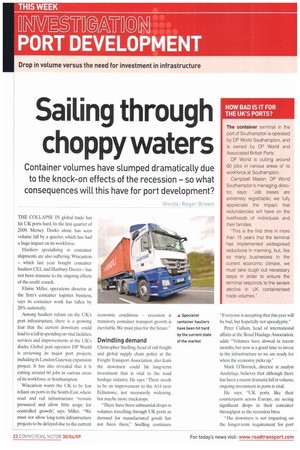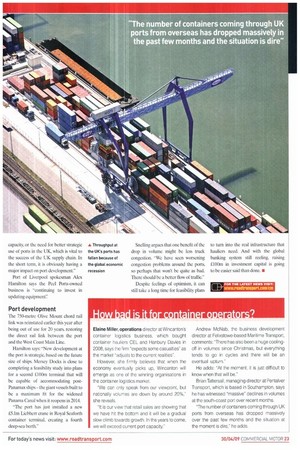Sailing through choppy waters
Page 22

Page 23

If you've noticed an error in this article please click here to report it so we can fix it.
Container volumes have slumped dramatically due to the knock-on effects of the recession so what consequences will this have for port development?
THE COLLAPSE IN global trade has hit UK ports hard. In the first quarter of 2009, Mersey Docks alone has seen volume fall by a quarter, which has had a huge impact on its workforce.
Hauliers specialising in container shipments are also suffering. Wmcanton — which last year bought container hauliers CEL and Hanbury Davies — has not been immune to the ongoing effects of the credit crunch.
Elaine Miller, operations director at the firm's container logistics business, says its container work has fallen by 20% nationally.
Among hauliers reliant on the UK's port infrastructure, there is a growing fear that the current downturn could lead to a fall in spending on vital facilities, services and improvements at the UK's docks. Global port operator DP World is reviewing its major port projects, including its London Gateway expansion project. It has also revealed that it is cutting around 60 jobs in various areas of its workforce at Southampton.
Wincanton wants the UK to be less reliant on ports in the South-East, where road and rail infrastructure "remain pressured and allow little scope for controlled growth': says Miller. "We must not allow long-term infrastructure projects to be delayed due to the current economic conditions — recession is transitory, container transport growth is inevitable. We must plan for the future:*
Dwindling demand
Christopher Snelling, head of rail freight and global supply chain policy at the Freight Transport Association, also fears the downturn could hit long-term investment that is vital to the road haulage industry. He says: "There needs to be an improvement to the A14 near Felixstowe, not necessarily widening, but maybe more truckstops.
"There have been substantial drops in volumes travelling through UK ports as demand for manufactured goods has not been there," Snelling continues. "Everyone is accepting that this year will be bad, but hopefully not apocalyptic."
Peter Cullum, head of international affairs at the Road Haulage Association, adds: "Volumes have slowed in recent months, but now is a good time to invest in the infrastructure so we are ready for when the economy picks up."
Mark O'Bornick, director at analyst Analytiqa, believes that although there has been a recent dramatic fall in volume, ongoing investment in ports is vital.
He says: "UK ports, like their counterparts across Europe, are seeing significant drops in their container throughput as the recession bites.
"The downturn is not impacting on the longer-term requirement for port capacity, or the need for better strategic use of ports in the UK, which is vital to the success of the UK supply chain. In the short term, it is obviously having a major impact on port development."
Port of Liverpool spokesman Alex Hamilton says the Peel Ports-owned business is "continuing to invest in updating equipment':
Port development
The 750-metre Olive Mount chord rail link was reinstated earlier this year after being out of use for 20 years, restoring the direct rail link between the port and the West Coast Main Line.
Hamilton says: "New development at the port is strategic, based on the future size of ships. Mersey Docks is close to completing a feasibility study into plans for a second f.100m terminal that will be capable of accommodating postPanamax ships—the giant vessels built to be a maximum fit for the widened Panama Canal when it reopens in 2014.
"The port has just installed a new £5.1in Liebherr crane in Royal Seaforth container terminal, creating a fourth deep-sea berth." Snelling argues that one benefit of the drop in volume might be less truck congestion. "We have seen worsening congestion problems around the ports, so perhaps that won't be quite as bad. There should be a better flow of traffic."
Despite feelings of optimism, it can still take a long time for feasibility plans to turn into the real infrastructure that hauliers need. And with the global banking system still reeling, raising L100m in investment capital is going to be easier said than done. •












































































































































